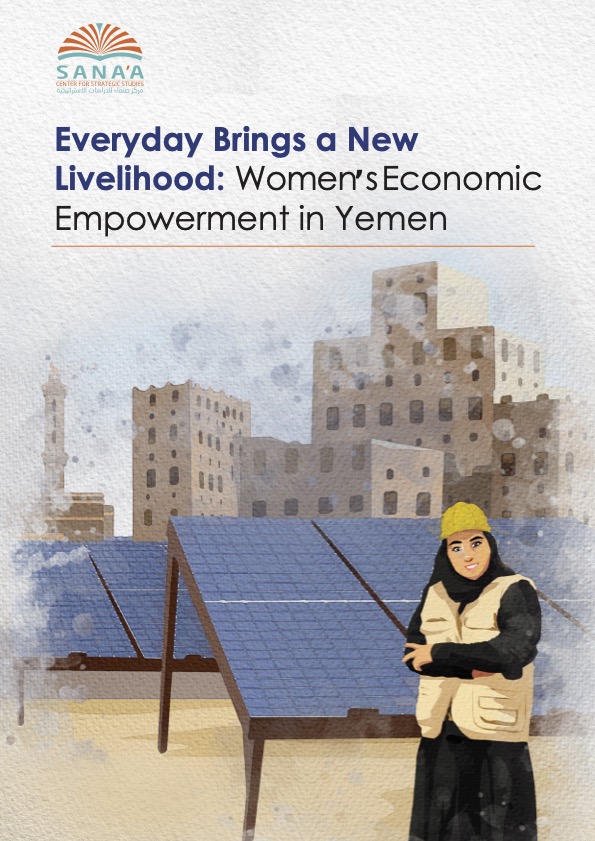Executive Summary
This report examines the implementation challenges facing organizations supporting women’s economic participation in Yemen. It explores how interventions can be strengthened to foster change in social norms and household dynamics, rather than simply provide short-term income for women. It argues that the short-term nature of international assistance is severely hindering Yemeni women’s economic empowerment and that a strategic shift in engagement is crucial at this critical juncture. This is particularly important given that Yemeni women are increasingly engaging in the labor market, and some donors are focusing more on long-term development strategies.
Rising female illiteracy, limited skills, lack of confidence, low self-esteem, and mental health issues were some of the barriers cited as limiting women’s income-earning pursuits and potential. Working women, including female entrepreneurs, navigate growing mobility constraints to access public life, further complicated by a widespread lack of national identification documents. Rising levels of gender-based violence (GBV) since the war in Yemeni households were also observed, as well as increased incidences of child marriage. There was a broad consensus that although more and more women are working to contribute to household expenses, they continue to bear primary responsibility for childcare, caring for the elderly, and household chores.
While data collected from a household survey conducted across six Yemeni governorates shows clear signs of changing attitudes toward working women, cultural, communal, and institutional barriers continue to limit women’s ability and opportunities to work. Although such barriers have not deterred many women from seeking employment, they have created additional layers of stress for them to pursue careers, education, and social activities. Mahram regulations, for instance, which require women to travel with a male guardian in Houthi-controlled areas and other parts of the country, were identified as a significant barrier. Meanwhile, perceptions that the international community is “corrupting” Yemeni women hinder efforts toward women’s economic participation. In more conservative parts of Yemen, traditional female income-earning activities like tailoring or making pastries and incense are deemed more acceptable, but they may or may not provide sustainable incomes. Weak infrastructure, particularly in telecommunications (phone and internet connectivity) and electricity, presents challenges to livelihoods and the economy of Yemen more broadly. Aspiring female entrepreneurs also contend with difficulties in accessing credit, since they are seen as a higher risk than men by banks, partially because they have fewer assets (e.g. land, buildings) for collateral and because family members may be unsupportive.
Across the board, the women, families, and representatives of organizations working in the field of women’s economic empowerment interviewed in the course of this research acknowledged that the challenges facing women workers are many and can sometimes be overwhelming. However, the increasing acceptance in Yemeni society of working women is significant and holds promise for opportunity if strategic shifts in programming are implemented. In particular, the adoption of an eco-system approach has the potential to transform economic participation into economic empowerment of women. This approach to entrepreneurship seeks to facilitate access to knowledge, resources, or support needed for women to succeed, while helping implementing organizations and donors to identify and address gaps in skills and support services. In addition, the prioritization of localization efforts and close collaboration with local civil society organizations at all stages of women’s economic empowerment initiatives emerged clearly in the report. Such an approach is not only essential for the success and sustainability of projects but ultimately serves as a strategic investment in Yemen’s future.
Select Recommendations
To Donors:
- Increase support for initiatives that improve women’s access to diverse sources of credit and expand loan guarantee efforts to de-risk working with women and youth.
- Work directly with quasi-governmental and local civil society organizations (CSOs) as partners to scale up successful interventions in women’s economic empowerment rather than viewing them as subcontractors for international organizations.
- Encourage the creation of specialized digital platforms for women to help them overcome barriers to their economic empowerment.
To the United Nations (UN) and International Non-Governmental Organizations (INGOs):
- Accelerate localization efforts to strengthen the capacity of local civil society to implement activities fostering women’s economic roles.
- Establish internal targets for all procurement opportunities of women-led businesses.
- Empower local female staff and Yemeni gender specialists to calibrate interventions to the local context and address the differing needs of women at various life phases.
To Local Civil Society:
- Conduct market analysis studies for all interventions supporting working women with a strong focus on non-traditional occupations in information and communications technologies (ICT), green technologies, and climate-smart agriculture for women.
- Develop partnerships with the private sector to develop vocational and entrepreneurship training opportunities.
- Seek informal alliances with like-minded civil society partners and, where possible, formalize such relations through virtual channels to confront emerging challenges and strengthen eco-systems in the entrepreneurship and innovations sectors.
To the Government and Local Authorities:
- Foster a spirit of collaboration among and in cooperation with UN agencies, INGOs, local CSOs, and private sector entities working in women’s economic empowerment to share lessons learned and avoid duplication of efforts.
- Study the needs of women entrepreneurs in relevant government bodies, which could include Tax Authority, Zakat Authority, Ministry of Industry and Trade, and General Author for Social Security and Pensions, and seek ways to create a more enabling environment, such as suspending government fees and taxation for a certain period of time.
This publication is the result of a collaborative effort by a team of international and Yemeni researchers. The team comprised gender specialists and experts with extensive knowledge and experience in supporting humanitarian and development efforts in Yemen, as well as expertise in business development, engineering, and IT. Due to security concerns at the time of publication, the authors have chosen to remain anonymous.
This report was produced as part of the Applying Economic Lenses and Local Perspectives to Improve Humanitarian Aid Delivery in Yemen project, funded by the Swiss Agency for Development and Cooperation.

